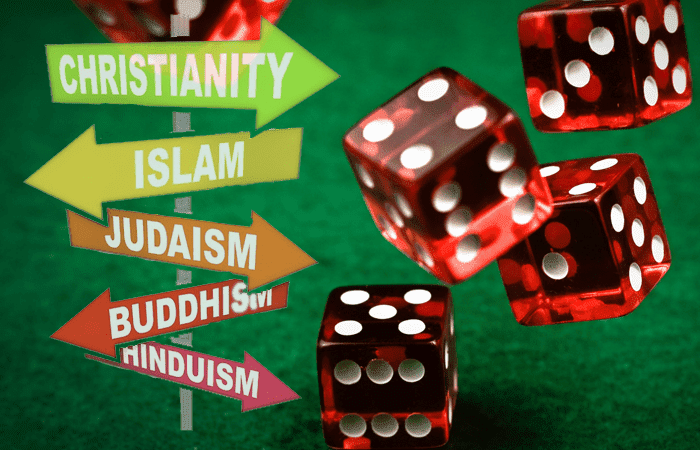
Is Gambling A Sin?
The topic of gambling in religion can be multi-faceted and split viewpoints. There is much discussion over whether gambling is beneficial or evil, yet there is no definitive solution to this subject. While gambling is a fun pleasure and pastime for some religious people, it is sinful and a sin for others. To learn more about whether gambling is sinful, keep reading.
Various Religions’ Gambling
While the majority of those who partake in gambling do not give it much thought in terms of morality or ethics, others do as it continues to gain popularity as a source of entertainment on a global scale. As gambling has been around for thousands of years, it doesn’t seem like its appeal will soon wane.
In most nations, there are multiple religions that have an impact on national ethics. It is crucial to consider all of the most popular religions rather than just one because of this.
Christianity – As gambling is not expressly forbid in the bible, it is acceptable in this religion. Many Christians, however, hold the view that gambling is a sin and should not be practiced because the bible deals with issues of money and greed. There are differing opinions within the faith, but as long as a person is not addicted, more and more individuals in the twenty-first century are accepting of gambling as a form of entertainment.
Islam – Gambling is not permitted in Islam because it is considered a way to steal someone else’s money because it isn’t earned. Almost all forms of gambling, including card games, table games, slot machines, horse racing, and the lottery, are prohibited by the Islamic faith. Due to the presumption that it is addictive, this religion can also be perceived as damaging to the social systems of the family and society.
Hinduism – In Hinduism, there is only one god for some people, whereas there are numerous gods for other people. As the focus of this religion is on karma rather than crimes, most Hindus disapprove of gambling because they think it might result in negative karma.
Buddhism – Siddhartha Gautama, the Buddha, founded this religion, which has ties to Hinduism. No deity in this religion has the power to forbid gambling, yet, like most religions, Buddhism generally forbids compulsive gambling. Yet, this religion is tolerant of all games of chance and accepts recreational gambling for enjoyment.
Judaism – Gambling is not expressly prohibited in Judaism, as it is in Islam, but it is also not promoted. Judaism, like Islam, considers losing money to be stealing, making it a sin. Also, it criticizes compulsive gambling and does not consider it to be a positive contribution to society. While some Rabbis forbid gambling, others view it as acceptable when used in moderation as a kind of amusement, similar to drinking.
As you can see, some religions such as Islam officially outlaw gambling and treat it as a sin while in others there is much more ambiguity and it is open to interpretation. Typically, all religions will oppose addictive gambling but some will accept it in moderation as a sort of enjoyment.
Why Is Gambling Banned by the Bible?
While some religions categorically outlaw gambling, others have less defined boundaries. Many people have interpreted the Bible to mean that gambling is immoral, but others are okay with it in moderation and do not see it that way.
Although the bible does not specifically mention gambling, it does contain some phrases that can be applied to games of chance. Many people relate this to gambling because the bible, for instance, talks about people having to work hard for their money and not gaining it by “doing nothing.” Also, the bible warns against engaging in any activity that encourages avarice, which some equate with this type of entertainment. Last but not least, a verse from the bible that is frequently associated with gambling talks about how money that is won rapidly will also disappear swiftly.
Others, especially when it pertains to charity, have a different perspective and do not view it as a sin. Also, they don’t hold the pejorative belief that any money won will ultimately be used for immoral activities like alcohol or drugs, but rather that it will be donated to good causes and used to carry out good deeds. So long as you use any potential profits for good, it is okay to play slots, blackjack, roulette, baccarat, and other games at the best online casino sites.
Conclusion
As you can see, it is not the act of gambling itself that certain faiths condemn, it is what is done subsequently with the money acquired or the adverse affects that a small number of players endure. Generally, gambling is not sinful, and there is no justification for not playing as long as people who partake in it do so responsibly, moderately, and use their earnings for good.
Article Source
https://www.casinosites.org/blog/is-it-a-sin-to-gamble/
Other Interesting Articles
 China Demand a Boon to S.Korea Casinos: Brokerage
China Demand a Boon to S.Korea Casinos: BrokerageMar 17, 2023











